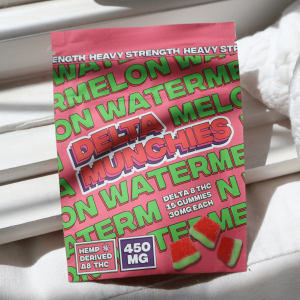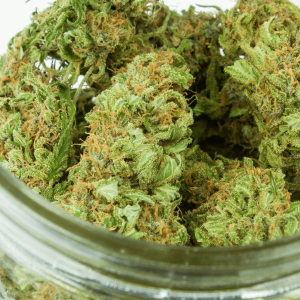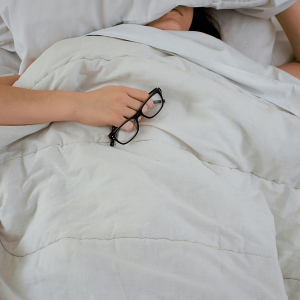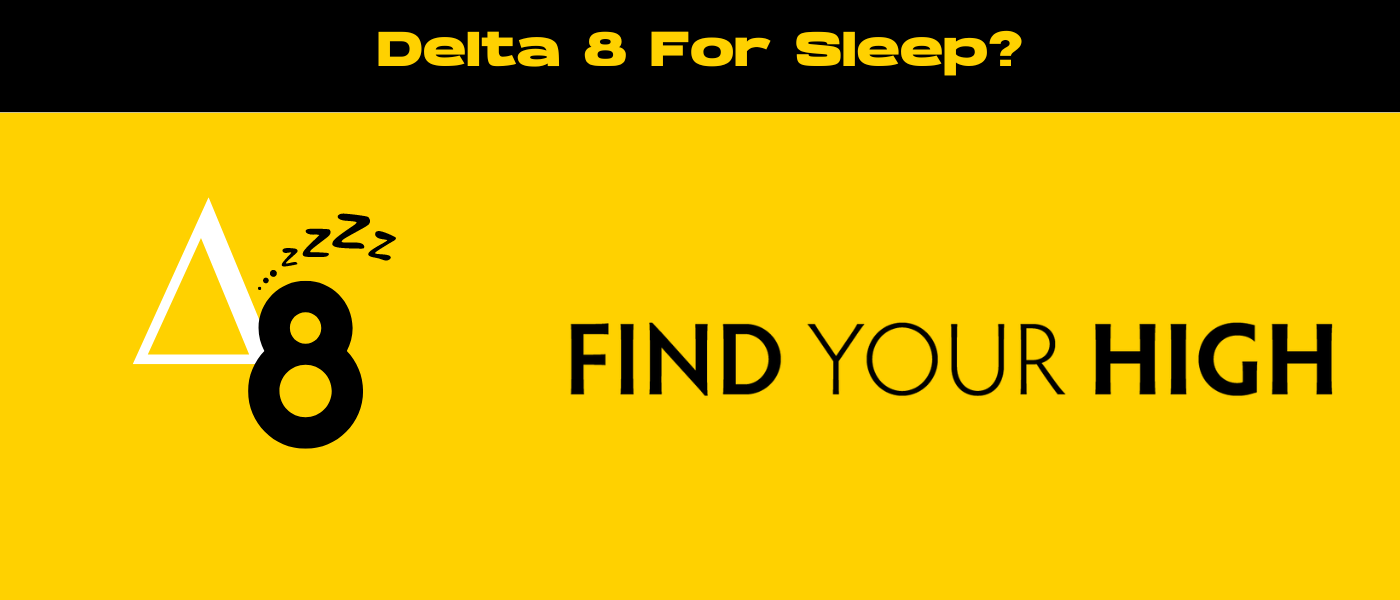Welcome to the world of Delta 8—a place where relaxation meets a good night’s sleep and where “counting sheep” is about as outdated as dial-up internet. So, delta 8 for sleep… good or bad?
Delta 8, the trending cannabinoid cousin of Delta 9 THC, is making waves in wellness circles for its mellow vibe without the sofa-gluing effects. It’s all the buzz right now, literally and figuratively, as more people discover its potential to enhance sleep quality without the wooziness of its psychoactive sibling from cannabis plants.
This blog is your ultimate guide to understanding how Delta 8 can help transform restless nights into blissful slumber. We’ll explore how it works, discuss its sleep-friendly benefits, and guide you through safe usage. Whether you’re a newbie to the scene or a seasoned pro seeking serenity, we’ve organized all the info you need to drift into dreamland effortlessly.
So, grab your favorite cozy blanket, brew a cup of chamomile tea (or a delta 8 gummy), and let’s dive into the sleep-enhancing magic of Delta 8. Sweet dreams await!
What is Delta 8?
Delta 8 THC, or Delta 8-tetrahydrocannabinol, is a naturally occurring cannabinoid found in the cannabis plant. It shares a similar chemical structure with the more famous Delta 9 THC, the primary psychoactive compound in cannabis, but with a slight difference in the position of a double bond. This seemingly small alteration at the molecular level results in significant differences in how each compound interacts with the body’s cannabinoid receptors, leading to the distinctive effects of Delta 8.
When comparing Delta 8 to Delta 9 THC, the most notable difference lies in their psychoactive potency. Delta 8 is known for providing a milder, more mellow high, which many users describe as offering the anxiety-reducing benefits of Delta 9 without the intense couch-lock or paranoia. While both compounds bind to the CB1 receptors in the brain, Delta 8 does so less aggressively, translating into a more clear-headed experience while maintaining a sense of relaxation.
The legal status of Delta 8 is a bit of a gray area. Federally, it has been considered legal under the 2018 Farm Bill, which legalized hemp-derived products. However, due to its psychoactive properties, certain states have taken steps to regulate or ban Delta 8, making its legality vary from place to place. It’s crucial to check your local laws before purchasing or using Delta 8 products.

Benefits of Delta 8 for Sleep
Delta 8 interacts with the body’s endocannabinoid system (ECS), a complex network of receptors and enzymes that play a role in regulating various physiological processes within the central nervous system, including sleep. By binding to the CB1 receptors, Delta 8 may help modulate sleep-wake cycles and promote a greater sense of calm, potentially leading to improved sleep quality.
Here are some potential benefits of Delta 8 for sleep improvement:
- Calmness and Relaxation: Delta 8’s mellow effects can help ease the mind into a state of tranquility, making it easier to fall asleep.
- Stress Reduction: By reducing anxiety and stress levels, Delta 8 may help quiet the mental chatter that often keeps people awake at night.
- Pain Relief: Its analgesic properties may help alleviate nighttime discomfort, allowing for more restful sleep.
- Regulated Sleep Cycles: Delta 8 may support the synchronization of circadian rhythms, leading to more consistent sleeping patterns.
- Reduced Nighttime Wakefulness: Its calming effects may decrease nighttime awakenings, leading to a more uninterrupted sleep experience.

Scientific Studies on Delta 8 and Sleep
While Delta 8 is creating quite the buzz, research into its effects, specifically on sleep, is still in its infancy.
A few preliminary studies have shown promising results. For instance, some research suggests that Delta 8 interacts with the body’s endocannabinoid system to potentially aid sleep by reducing anxiety and promoting calmness. The endocannabinoid system plays a crucial role in regulating various bodily processes, including the sleep-wake cycle, which might explain Delta 8’s effect on sleep quality. However, it’s important to note that the majority of studies focus on the broader category of cannabinoids, leaving a significant gap when it comes to Delta 8 specifically.
The credibility of these studies varies. They provide valuable insight, yet many rely on small sample sizes or animal models, and there’s a need for more peer-reviewed human trials to establish definitive connections between Delta 8 and sleep improvement. As with any early-stage research, there are limitations, including variability in product quality and concentration, regulatory challenges, and individual differences in response to cannabinoids.
Nevertheless, the findings suggest potential benefits that warrant further exploration, with hope that future studies will be able to draw clearer correlations and bolster the understanding of Delta 8’s role in sleep enhancement.
Dosage: Finding the Right Amount
Figuring out the perfect Delta 8 dosage for catching some quality z’s can feel like solving a puzzle with pieces that keep changing. Since everyone’s endocannabinoid system is as unique as their fingerprint, there isn’t a one-size-fits-all approach.
Generally, starting low and going slow is the mantra. Most folks find that a dosage between 10-40 mg of Delta 8 works for promoting sleep. Factors like body weight, previous exposure to cannabinoids, and your personal sensitivity play a starring role in dialing in on the sweet spot. Consider these guidelines:
- Begin with a Low Dose: Newbies might start with 5-10 mg and gradually increase until the desired effect is achieved.
- Consider Your Body Weight: Higher body mass might require a higher dosage, but always proceed with caution.
- Factor in Tolerance Levels: Regular users may need a bit more due to built-up tolerance, but again, moderation is key.
Be mindful of overindulging, as incorrect dosages may lead to grogginess, dizziness, or an unexpectedly wild ride to the land of nod, instead of a gentle drift off to dreamland.
How to Use Delta 8 for Sleep
Navigating the vast sea of Delta 8 products can be as confusing as it is exciting. Edibles, tinctures, vapes—oh my! Each form delivers Delta 8 to your system a bit differently, and timing plays a crucial role in achieving those blissful slumbers. Here’s a quick breakdown:
- Edibles: Gummies or chocolates may take 1-2 hours to kick in, but their effects can last longer, making them great for a steady sleep cycle.
- Tinctures: Placed under the tongue, tinctures offer quicker absorption; expect effects within 30-60 minutes.
- Vapes: Deliver rapid effects ideal for immediate relaxation, but it might not last as long as other methods.
Consider crafting a calming pre-bedtime routine: unwind with a warm bath, slip into some comfy PJs, and perhaps enjoy a Delta 8 gummy an hour before your head hits the pillow. Adjust based on how your body responds—it’s a personal voyage towards sleep serenity tailored perfectly for you!

Safety and Side Effects
While Delta 8 is consumed for its chill-out vibes and potential sleep-friendly powers, it’s not without side effects.
Common ones include dry mouth, mild dizziness, or that oh-so-familiar red-eyed look. For those setting off on a Delta 8 journey, managing these side effects is generally straightforward—stay hydrated, consider lower doses if dizziness kicks in, and perhaps keep some comforting eye drops on hand.
Safety, of course, is key. It’s important to avoid driving or operating heavy machinery after taking Delta 8, as it may impair reaction times. Also, steer clear if you’re pregnant, nursing, or have underlying health conditions that might clash with cannabinoids.
Before diving into the world of Delta 8, consulting with a healthcare professional is advised. They’ll help you better understand how this cannabinoid might gel with your individual health needs and conditions, ensuring a safer experience that aligns with your aspirations for better sleep.
Comparing Delta 8 with Other Sleep Aids
When it comes to catching those ever-elusive Z’s, Delta 8 isn’t the only game in town. Traditional sleep aids like melatonin and prescription medications have long been trusted allies in the fight against sleepless nights.
Melatonin, a natural hormone often found on drugstore shelves, lulls you to sleep by regulating your natural sleep-wake cycle. Its safety profile is generally sound, but some users experience grogginess or vivid dreams. On the flip side, prescription meds like benzodiazepines pack a more potent punch, often kicking insomnia square in the pants. Yet, they come with a hefty load of potential side effects and the risk of dependency.
Enter Delta 8, the new kid on the sleep block, flaunting a mellower demeanor with fewer notorious repercussions. Many users appreciate Delta 8’s ability to soothe without heavily altering their state or dragging them through a fog the next day.
The appeal of Delta 8 often lies in its use as a natural sleep aid and perceived balanced effect, bridging the gap between the gentle touch of melatonin and the firm nudge of prescription alternatives. Each option bears its own set of pros and cons, but for those pursuing a more organic route with minimal side effects, Delta 8 stands out as a formidable contender in the quest for peaceful slumbers.

Delta 8 For Sleep: Conclusion
In this deep dive into the realm of Delta 8, we’ve explored the nuances of dosage, product types, and its safety profile, comparing it to other sleep aids like melatonin and prescription medications. Delta 8 emerges as a promising, natural sleep aid with a gentle touch for a restful night.
If you’re on the hunt for a sleep aid that’s both effective and mellow, Delta 8 could be your dream companion. Do share your experiences or fire away with questions in the comments—let’s snooze smarter, not harder, together!
Frequently Asked Questions
1. Can you take Delta 8 for sleep?
Absolutely! Delta 8 can be a helpful addition to your nighttime routine, thanks to its very mild psychoactive effects. Many users report smoother sleep transitions with Delta 8 compared to other aids. Just remember, like with any supplement, it’s best to start with a lower dose to gauge how your body adjusts and whether or not it really does help you fall asleep faster.
2. What Delta 8 strain is best for sleep?
When it comes to catching some Z’s, Indica-dominant strains are often the go-to, as they are well-known for their relaxing properties. Strains like Northern Lights and Granddaddy Purple have been lauded for their calming benefits, potentially easing you into a more restful slumber. But ultimately, personal preferences may vary, so a little experimentation might be in order to find your perfect match.
3. Is CBN or Delta 8 better for sleep?
A natural sleep aid, CBN (Cannabinol), is frequently recognized for its role in a better night’s sleep and relaxation, sometimes even touted as the “sleepy cannabinoid.” On the other hand, Delta 8 offers a more balanced effect, relaxing without heavy sedation. If you’re seeking a gentle nudge towards sleep, Delta 8 might suit you, but for deeper sleep issues, CBN could be worth considering.
4. What is the best Delta 8 for relaxation?
For pure relaxation without tipping over into couch-lock territory, look for Delta 8 products combining Indica strains with calming terpenes like myrcene or linalool. Gummies or tinctures provide a steady release, making them ideal for unwinding after a long day. It’s all about finding what makes you feel like a serene version of yourself—totally zen and ready for some chill time.

 Rewards
Rewards




